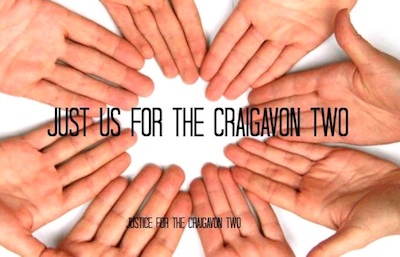
The case against two Craigavon men convicted of shooting a PSNI man in 2009 appears to be nearing collapse as the appeal against their convictions took place this week at the Court of Appeal in Belfast.
Stephen Carroll was the first member of the RUC police to be killed in the conflict since the force was relaunched as the PSNI in 2001. The ‘Continuity IRA’ claimed responsibility for the attack.
Carroll was ambushed and shot dead in an ambush in Craigavon. His death, which took place the day after after two British soldiers lost their lives in a separate attack, helped fuel demands among government figures in Ireland and Britain for a ‘clampdown’ on republican hardliners.
Arrested quickly afterwards but held without bail for years before their Diplock (non-jury) trial, John Paul Wootton (aged 17 at the time of the killing) received a 14-year sentence, while Lurgan man and former Sinn Fein councillor Brendan McConville was handed a sentence of at least 25 years.
Supporting them in the Court of Appeal this week were their family, friends and campaigners, including independent observers from human rights organisations such as human rights clergyman Monsignor Raymond Murray and miscarriage of justice campaigner Gerry Conlon.
Former 26-County government minister Eamon O Cuiv, independent TDs Mick Wallace and Maureen O’Sullivan, Socialist Party TD Clare Daly and Sinn Fein justice spokesperson Raymond McCartney were also present in the public gallery.
The court heard how there was a “total absence” of evidence to link Mr Wootton to the fatal shooting, and that circumstantial evidence against Mr McConville relied entirely on a witness described as a ‘Walter Mitty’ character.
Counsel for Mr Wootton hit out at the quality of the forensic science used by the prosecution in the case, describing it as “lamentable”.
Gun residue discovered on a coat in Mr Wootton’s car that night was never linked to the shooting, and the forensic work carried out on it had “failed to conform to even the most fundamental basic requirements”, said Arthur Harvey QC.
He also pointed out that no role in the shooting was ever attributed by prosecutors to Wootton.
Prosecutors were forced to accept they could not prove that neither Brendan McConville or the weapon used in the attack were transported in Mr Wootton’s car.
Mr McConville’s legal team opened the hearing with a damning assessment of the account given by a man referred to only as ‘Witness M’ who claimed to have seen him in the area around the time of the killing.
The prosecution case depends entirely on circumstantial evidence based on this alleged sighting.
Witness M was described as a “dishonest, demonstrably unreliable witness whose account of what he saw on the night in question bordered on the farcical”.
The court heard that Witness M had given his account to the PSNI in a drunk state via telephone some 11 months after the gun attack, while demanding money and relocation.
A witness is set to testify before the court next week that Witness M “lives in a world of his own” and often said things that simply were not true.
Earlier, appeal judges heard how this new witness had been “nobbled” by the police or prosecution when just days before the original scheduled date for the appeal in April, he was arrested and held for two days before being released without charge.
The barrister said there were also contradictory claims as to precisely when Witness M -- who at one stage admitted going home and discussing the matter with his partner -- had concluded there was a connection between what he saw and the shooting.
“Once again that ought to have alerted the police officer and indeed, we say, the trial judge, to the fact that this man was not a reliable historian, to put it mildly,” the lawyer said.
A tracking device which is said to have tracked Mr Wootton’s car -- and prior to the original trial, mysteriously disappeared and returned with a large section of data deliberately erased -- also showed no evidence that Wootton had ‘dropped off’ McConville, as argued by prosecutors.
Lawyers for Mr McConville are later to seek to have former prison ombudsman Pauline McCabe and former Maghaberry jail governor Steve Rodford called to give evidence at the appeal, it is understood.
An investigation by Ms McCabe into the discovery of a note containing Mr Rodford’s personal details in McConville’s remand jail cell in 2009 eventually concluded that it was probably planted by a prison officer. However, the planting of the note helped to smear Mr McConville ahead of the original trial.
‘CONCERNS’
The hearing is expected to last up to 8 days, with fresh defence evidence expected to be presented next week.
Monsignor Murray said he had concerns about the men’s conviction hoped “justice will be done”.
“Concern has been expressed and I express it myself regarding the evidence of a key prosecution witness, the alleged intimidation of a new witness and serious questions have to be raised regarding forensic evidence,” he said.
“All these will have to be thoroughly examined in the appeal case and it is my opinion that the two men will be proved innocent.”
![[Irish Republican News]](https://republican-news.org/graphics/title_gifs/rn.gif)
![[Irish Republican News]](https://republican-news.org/graphics/title_gifs/harp.gif)

